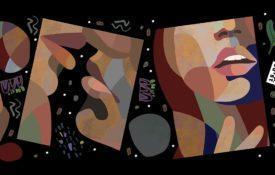-
The Brain Guesses What Word Comes Ne-
In the midst of a conversation with an acquaintance, your brain might skip ahead, anticipating the words that the other person will say. Perhaps then you will blurt out whatever comes to mind. Or maybe you will nurse your guess quietly, waiting to see if—out of all the hundreds of thousands of possibilities—your conversational partner will arrive at the same word you have been thinking of. Amazingly, your companion will often do so. How does the brain do this? Figuring out how we process language has long been a focus for neuroscientists. Massachusetts Institute of Technology researchers brought a new take to the question using a technique called integrative modeling.
-
The Twisted Paths of Perception
The King Pedro IV Square in Lisbon, Portugal, better known as the Rossio, regales visitors with a delightful exemplar of the traditional pavement called calçada portuguesa. Originally cobbled in 1848, the dizzying light and dark undulations symbolize the sea voyages of Portuguese navigators and predate 20th-century designs by Op Art creators such as Victor Vasarely and Bridget Riley, while inducing similar perceptions of flowing motion. But does the vibrant pattern stand in the way of safety? A recent study from the University of Bristol in England asked participants how walking on floors patterned with visual illusions affected their discomfort levels and feeling of instability.
-
‘Self-Care’ Isn’t the Fix for Late-Pandemic Malaise
If years could be assigned a dominant feeling (1929: despair; 2008: hope), 2021’s might be exhaustion. As the coronavirus pandemic rumbles through its 20th month, many of us feel like we are running a race we didn’t sign up for, and it’s getting longer every mile we run. With this slog has come a renewed focus on mental health. During the pandemic, universities have poured money into psychological resources. Corporations have hired chief health officers and invested in wellness services. In 2020, the mindfulness app Headspace saw a 500 percent increase in corporate-subscription requests.
-

Science Rewind: Revisiting Three of Our Favorite Early Stories
As Under the Cortex enters its second year, we decided to comb through the archive and revisit three exciting stories from our early days.
-

New Content from Advances in Methods and Practices in Psychological Science
A sample of articles on a replication of a study on spontaneous verbal rehearsal in memory, generalizable effects of feedback across college classes, Bayesian model-averaged meta-analysis, views of replication, model evaluation, chow replications influence future citation patterns, and data visualization (with tutorials).
-

Sex, Drugs, and Genes: Moral Attitudes Share a Genetic Basis
By studying both identical and fraternal twins, researchers suggest that largely the same heredity factors that influence openness to casual sex also influence a person’s moral views toward recreational drug use.

